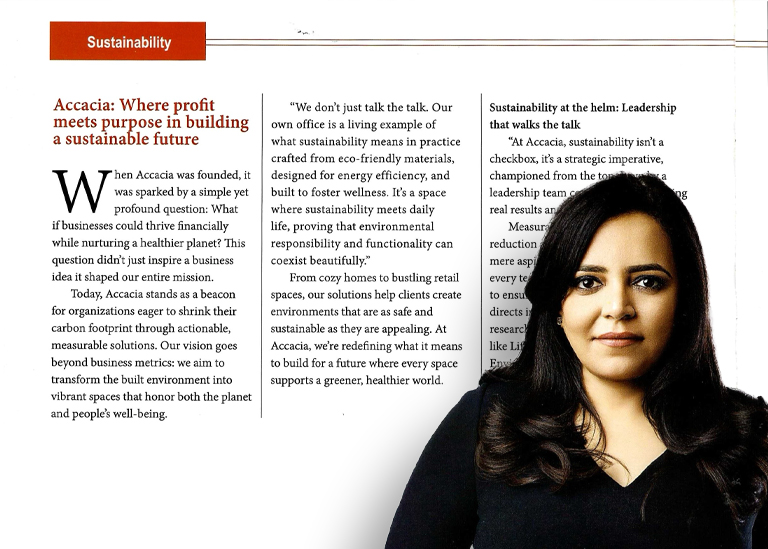
When Accacia was founded, it was sparked by a simple yet profound question: What if businesses could thrive financially while nurturing a healthier planet? This question didn’t just inspire a business idea—it shaped our entire mission

As the climate crisis intensifies and regulatory demands grow sharper, the real estate sector-responsible for nearly 40% of global emissions-stands atthe center of the decarbonization imperative. Leading this transformation is Accacia, a next-generation climate-tech platform that integrates Al-driven emissions intelligence with vertically integrated decarbonization infrastructure, offering a full-stack pathway to net zero for the built environment.

In this episode, Annu Talreja, founder and CEO of Accacia, talks about how her company is helping the real estate sector accelerate their efforts to decarbonise their operations. Annu, an architect and urban planner by training, is building a software as a service platform at Accacia, her second venture, backed by marquee investors including Accel, B Capital, Blume Ventures and Rainmatter - Forbes India

The real estate sector is responsible for nearly 40% of global carbon emissions, the majority of which come from building operations and construction. The industry at large is under mounting pressure to meet increasingly stringent global climate goals. These include significant emission reductions to limit global warming to 1.5˚C above pre-industrial levels, necessitating drastic sector-wide changes.

Accacia, a decarbonisation platform focusing on the real estate and infrastructure sectors, has successfully closed a $6.5 million pre-Series A funding round. Accacia, initially established in Asia, has already deployed its solution to over 25 million square feet of commercial real estate, with Singapore emerging as a significant market, contributing approximately 70% to its revenue. - CNBC-TV18

Annu Talreja is a second-time founder with her company Aspeen Venture, better known as Accacia for its eponymous carbon tracking and decarbonisation recommendation engine, primarily for the real estate and infrastructure sector. Talreja is an architect and urban planner, whose experience spans design, construction, investments, asset management, and operations. Globally, the top-tier of the industry is undergoing a “mindset shift”, Talreja says, with the realisation that the impact of climate change on real estate is here and now, and that it’s no longer simply an ESG (environmental, social, and governance) reporting requirement. - Forbes India

The real estate industry faces a critical challenge as climate risks grow in frequency and intensity. As global warming accelerates, environmental changes—rising sea levels, increased storm frequency, and extreme temperature shifts—are reshaping real estate investment strategies, asset valuations, and urban development. The future of real estate now hinges on how well stakeholders integrate climate risk into their decision-making processes.

The real estate sector faces increasing climate-related risks, with much focus traditionally placed on physical risks like extreme weather. However, transition risks — stemming from the shift to a low-carbon economy are equally critical. These risks include rising costs due to carbon pricing, market effects, technological changes, legal liabilities, energy efficiency regulations, and reputational risks, all of which can impact property values.